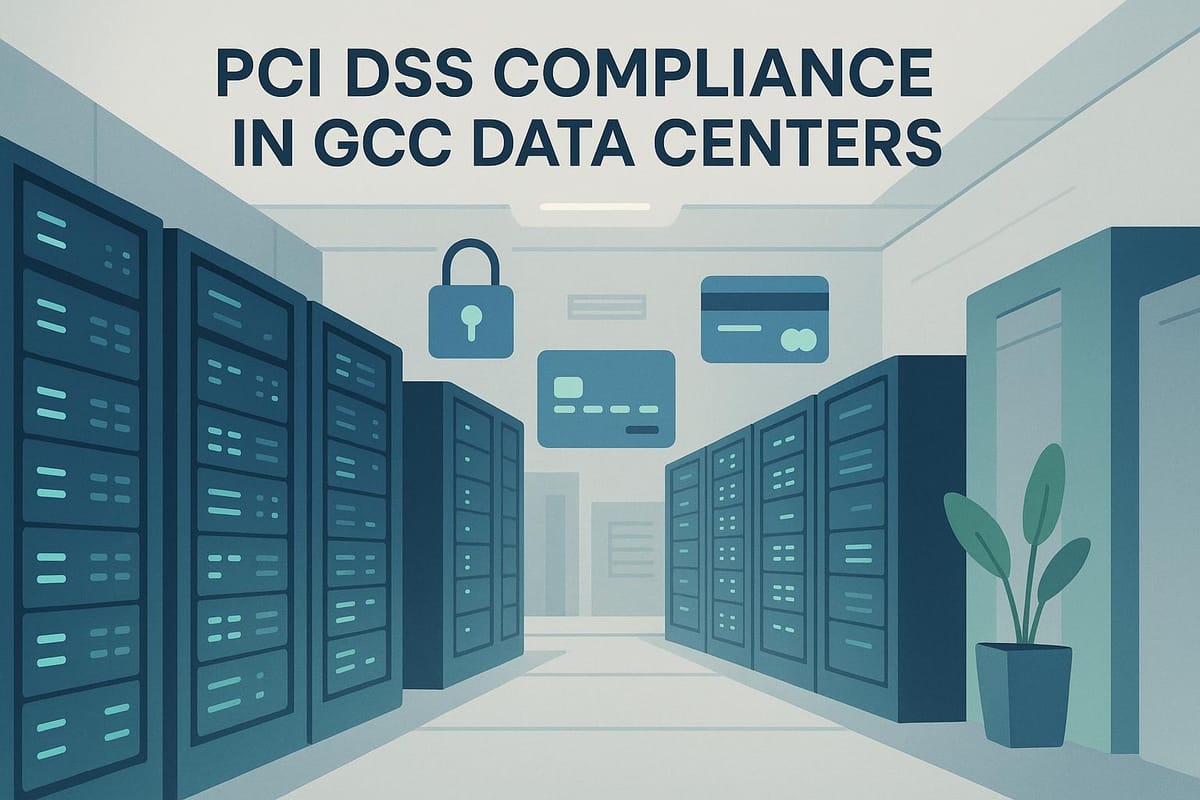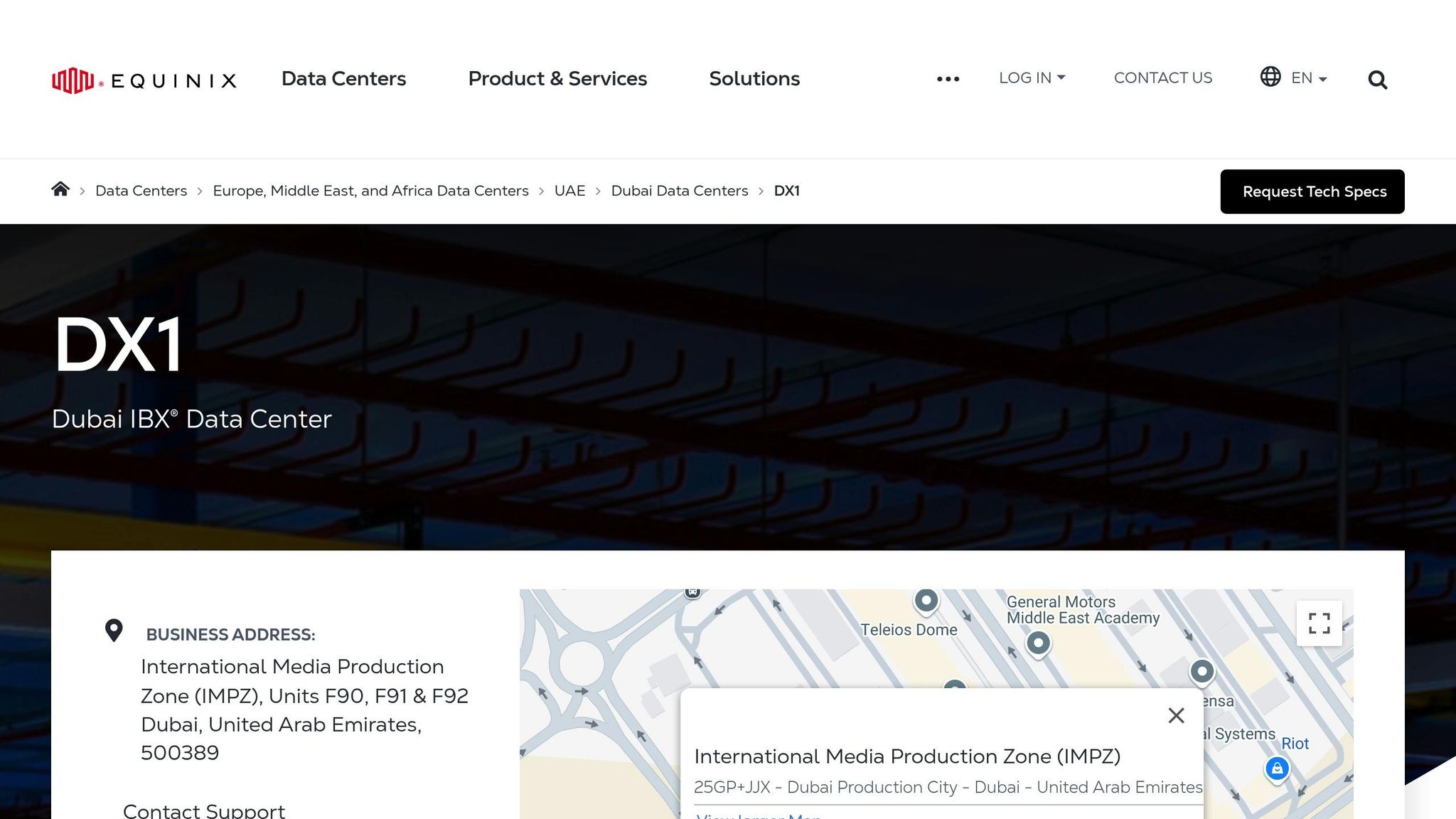PCI DSS Compliance in GCC Data Centers
Explore how GCC data centers are navigating PCI DSS compliance amidst regulatory challenges and the booming digital payment landscape.

Did you know? The GCC’s digital payment market is booming, with e-commerce expected to hit AED 183.5 billion by the end of 2025. But with this growth comes increased security risks. That’s where PCI DSS compliance steps in - a global standard ensuring the safety of payment card data.
Key Takeaways:
- What is PCI DSS? A security framework for businesses handling card payments, divided into 4 compliance levels based on annual transactions.
- Why is it important? Protects sensitive payment data, reduces fraud, and builds trust in the growing digital payment ecosystem.
- GCC Data Centers: With rapid growth, they’re adopting advanced security measures like AI surveillance, biometric authentication, and eco-friendly solutions.
- Challenges: High costs, regulatory differences across GCC nations, and a shortage of skilled cybersecurity professionals.
- Solutions: Cloud-based compliance tools, automated monitoring, and investments in training programs.
Quick Fact:
The average cost of a data breach in the GCC is AED 27.34 million, making PCI DSS compliance essential for businesses and data centers in the region.
Why it matters: As cyberattacks rise and digital payments expand, PCI DSS compliance not only safeguards operations but also ensures alignment with local and global regulations. Keep reading to learn how GCC data centers are tackling these challenges and setting benchmarks in security.
Stress-free PCI-DSS auditing in VMware Data Centers
GCC Compliance Requirements
The impact of PCI DSS on GCC data centers goes beyond global standards, as regional compliance heavily depends on local regulatory frameworks.
GCC countries blend PCI DSS with their own cybersecurity policies to safeguard payment data. For instance, the UAE enforces its Information Assurance Regulation, while Saudi Arabia aligns the SAMA framework with PCI DSS standards. Similarly, Qatar, Bahrain, Oman, and Kuwait have their own regulations that complement PCI DSS. Notably, Saudi Arabia saw a 70% drop in card-present fraud after adopting EMV technology. However, these differing regulations can complicate operations for data centers managing services across multiple GCC nations.
Cross-Border Compliance Issues
Operating data centers across GCC borders presents unique challenges. Variations in audit requirements, data localisation rules, and enforcement practices can create significant hurdles. On top of that, the financial risks are substantial - the average cost of a data breach in the region is AED 27.34 million (USD 7.45 million). These factors highlight the importance of cohesive security strategies to navigate the diverse regulatory landscape.
National Security Frameworks
National cybersecurity frameworks play a crucial role in implementing PCI DSS across GCC data centers. Here’s how some countries approach it:
-
UAE Information Assurance Regulation
This regulation outlines mandatory security controls for payment processing facilities, ensuring alignment with PCI DSS. -
Saudi Arabia's NCA Framework
Combines local standards with PCI DSS, focusing on continuous monitoring and real-time auditing. -
Qatar's National Cyber Security Strategy
Merges national security goals with PCI DSS compliance measures.
Interestingly, over half of GCC organisations now rely on automated tools for compliance monitoring and real-time risk assessment.
Reasons for PCI DSS Implementation
Data centers in the GCC region are adopting PCI DSS standards to meet the demands of a rapidly growing digital payment landscape. Several factors are driving this trend.
Digital Banking Expansion
The region's data center capacity is expected to soar, from 1GW in 2025 to 3.3GW within five years. Saudi Arabia's banking sector, fuelled by Vision 2030 projects, recorded an impressive AED 87.77 billion (USD 23.9 billion) in profits in 2024 - a 15% increase. This robust growth in digital finance is creating a strong foundation for enhanced security initiatives aligned with PCI DSS.
Security Programs
Advanced security measures are also playing a crucial role. For instance, Cisco's UAE PoP for cloud security and IBM's Generative AI for threat detection exemplify cutting-edge initiatives supporting PCI DSS compliance. With global cybercrime expected to cost AED 38.55 trillion (USD 10.5 trillion) annually by 2025, these programs are becoming increasingly essential.
Market Benefits
Implementing PCI DSS standards provides data centers with clear advantages, including:
- Customer Trust: Strengthened ability to combat external cyber threats.
- Operational Efficiency: A projected 14.2% CAGR in PCI Compliance Services between 2025 and 2033.
- Regulatory Alignment: Automated tools that reduce audit-related expenses.
- Market Access: Enhanced capability to support financial institutions effectively.
A compelling example is the January 2025 deployment of Axis Communications' Perimeter Defender Solution at Moro Hub. This solution combined visual and thermal cameras with advanced analytics to achieve robust security compliance.
However, maintaining PCI DSS compliance is no small feat. Only 29% of companies remain compliant a year after validation, underscoring the importance of ongoing security efforts and regular evaluations. These benefits highlight the critical need to address implementation challenges, which will be explored in the following section.
Implementation Obstacles
Implementing PCI DSS compliance in GCC data centers comes with its fair share of challenges. While the benefits are evident, the process uncovers operational hurdles that demand strategic solutions.
Technical Limits
Deploying PCI DSS compliance systems often reveals technical roadblocks. Many data centers struggle with hardware constraints and gaps in monitoring when integrating comprehensive security solutions. For instance, traditional Identity and Access Management (IAM) systems frequently fall short in hybrid environments, leaving vulnerabilities unaddressed. These limitations highlight the pressing need for skilled professionals who can navigate and manage these advancing security systems effectively.
Staff Training Needs
The shortage of skilled cybersecurity professionals poses a critical issue. Expertise is required not only for the technical aspects of compliance but also for understanding regulatory frameworks.
"Our focus at KPMG in Qatar is to empower seamless compliance journeys and programs to enable regulatory and industry compliance requirements as well as enhance security posture to meet the evolving threat landscape in the digital era."
– Marwan Zalloum, Director of Cyber Services, KPMG in Qatar
To address this gap, organisations are investing heavily in training programmes that cover:
| Training Aspect | Key Requirements |
|---|---|
| Technical Skills | Cloud security practices, emerging threats, and monitoring systems |
| Compliance Knowledge | Understanding local regulations and cross-border requirements |
| Operational Procedures | Incident response, audit preparation, and documentation practices |
Resource Requirements
Financial constraints add another layer of complexity to PCI DSS implementation. The Middle East Data Center Physical Security Market is expected to reach AED 785.91 million (USD 213.98 million) by 2032, reflecting the high costs associated with compliance efforts.
Some of the most pressing financial challenges include:
- High upfront costs for infrastructure upgrades
- Ongoing expenses for system maintenance
- Fees for regular compliance audits
- Continuous investment in personnel training
In response to these challenges, companies are exploring cost-effective solutions. For example, in September 2023, Johnson Controls launched its OpenBlue Service, designed to ensure the reliable performance of data center security devices. Additionally, many GCC data centers are turning to cloud-based PCI compliance tools and collaborating with Managed Security Services Providers (MSSPs). These approaches help distribute costs while maintaining robust security standards.
Implementation Examples
The GCC region has seen notable examples of successful PCI DSS implementations, with some of the leading data centres setting benchmarks for compliance.
stc pay Bahrain

In July 2024, stc pay Bahrain achieved PCI DSS v4.0 certification after undergoing a rigorous audit process. Their approach to implementation emphasised key areas:
| Implementation Area | Highlights |
|---|---|
| System Security | Improved network monitoring and advanced threat detection |
| Data Protection | Utilised cutting-edge encryption protocols to secure payment data |
| Access Controls | Strengthened authentication systems and user verification processes |
"As we are witnessing the rapid acceleration from all businesses towards digital transformation, business owners and executives need to ensure the highest protection of their businesses and their customer's data from cyber threats. stc Bahrain, being certified by a global industry standard for data security will indeed provide confidence and help organizations to protect their customer data to build the trust for business growth".
Equinix DX1 Dubai

Equinix DX1, certified for PCI DSS compliance as of May 2024, hosts the UAE Internet Exchange (UAE-IX). The facility employs a multi-layered security framework, blending robust physical and digital measures to ensure the protection of payment data. These efforts showcase the shared strategies that define effective PCI DSS compliance across the region.
Key Success Factors
Examining these cases reveals several critical elements that contribute to successful PCI DSS implementations:
-
Comprehensive Security Infrastructure
Advanced surveillance systems and integrated security solutions provide end-to-end protection, covering everything from access points to server racks. -
Regular Compliance Monitoring
"Achieving PCI DSS v4.0 certification is testament to our commitment to providing a secure and trustworthy payment card platform. It demonstrates our proactive approach to data security, always staying ahead of the curve to protect our customers' sensitive information".
-
Investment in Technology
The Middle East Data Center Physical Security Market is expected to grow to AED 785.91 million by 2032. Successful implementations typically focus on the following areas:Investment Area Focus Points Physical Security Advanced surveillance systems and access controls Digital Protection AI-driven threat detection tools Staff Training Educating teams on security protocols Compliance Management Conducting regular audits and maintaining certifications
Future Developments
The landscape of GCC PCI DSS compliance is undergoing rapid transformation, with the market expected to reach an impressive AED 25.73 billion by 2025, growing at a 14.2% compound annual growth rate (CAGR). This growth is driving advancements in both technology and processes, addressing prior challenges and laying the foundation for a more robust compliance framework.
New Security Tools
Emerging technologies are reshaping how compliance is managed across the GCC. AI and automation are stepping into the spotlight, offering solutions that improve efficiency and security. For instance, American Express has adopted NVIDIA AI to enhance fraud detection and combat cybercrime.
| Technology | Focus | Impact |
|---|---|---|
| AI-Driven Detection | Real-time threat identification | 99% average prevention rate |
| Automated Compliance | Continuous monitoring systems | Simplified compliance management |
| Cloud Security | Multi-cloud architecture | Improved cross-border operations |
"The IT services provided for our GCC setup in Pune exceeded our expectations. The AI-driven solutions implemented have transformed our operations, delivering significant cost savings while enhancing productivity and innovation capabilities." – Chief Technology Officer, Fortune 500 Company
GCC Standards Alignment
The region is moving toward greater alignment with global PCI DSS standards, aiming to create a unified compliance framework. This shift is driven in part by the rising costs of security breaches, which have highlighted the need for standardisation across the GCC.
| Compliance Area | Current Status | 2025 Target |
|---|---|---|
| Data Protection | Local regulations | Unified GCC framework |
| Cross-border Operations | Country-specific | Regional standardisation |
| Audit Processes | Individual assessments | Centralised verification |
"We have seen a lot of cases in the world where the storage and processing of credit card details have been compromised and obviously more security is necessary and in turn, any organisation, any company, any non-profit organisation, it does not matter who, anyone who stores or processes credit card details would need to comply with PCI DSS." – Dr Angelika Plate, director of Strategic Security Consulting at help AG
As these standards converge, the need for specialised skills and training becomes increasingly critical to fully utilise the benefits of a harmonised framework.
Skills Development
The complexity of compliance standards continues to grow, making targeted training programmes essential. A leading telecommunications company in Saudi Arabia showcased the benefits of integrating multiple standards, including NCA, SAMA, PCI DSS, and ISO, into a unified compliance framework. Their strategy focused on three key areas:
| Training Area | Implementation Strategy | Outcome |
|---|---|---|
| Technical Skills | Continuous learning programmes | Improved operational efficiency |
| Risk Assessment | Dynamic evaluation systems | Proactive threat management |
| Compliance Culture | Security-aware workforce | Fewer incidents |
With cybercrime projected to cost the global economy AED 38.55 trillion annually by 2025, GCC data centres are prioritising these advancements. By focusing on skills development and adopting cutting-edge technologies, they aim to maintain strong security measures and stay ahead of evolving compliance demands.
Summary
The digital payment landscape in the GCC is rapidly evolving, driving a surge in PCI DSS compliance efforts. The region's cybersecurity market is projected to hit AED 111.51 billion by 2032, growing at a rate of 12.46% annually. This highlights how crucial data security has become in the digital payment ecosystem.
The financial costs of inadequate security measures are staggering. For instance, the average data breach now costs organisations around AED 15.97 million. This aligns with the trend of increasing cybersecurity budgets, emphasising the urgent need for stronger security measures.
| Security Challenge | Current Impact | Industry Response |
|---|---|---|
| Cyber Attacks | 1,636 attacks per week (+30% YoY) | Advanced AI-driven detection systems |
| Data Breaches | AED 15.97M average cost | Enhanced encryption protocols |
| Financial Sector Threats | Attack every 39 seconds | Increased security investments |
The GCC's approach to PCI DSS compliance has kept pace with technological advancements and strategic changes. Cloud-based compliance solutions are increasingly popular, offering both scalability and improved security features. Automation tools are also playing a larger role, streamlining compliance processes by reducing manual workloads and improving accuracy.
As global cybercrime costs are expected to soar by 2025, GCC data centres are taking proactive steps. Many are partnering with Managed Security Services Providers (MSSPs) to tap into specialised expertise and resources. Combined with robust governance frameworks and continuous monitoring, these efforts ensure that GCC data centres can tackle emerging security challenges while maintaining global compliance standards.
FAQs
How do data centers in the GCC ensure PCI DSS compliance while navigating different regulatory requirements across the region?
Data centres across the GCC face the intricate task of adhering to the Payment Card Industry Data Security Standard (PCI DSS) while also navigating a patchwork of national regulations. Each country in the region has its own set of legal requirements, which may include data localisation laws or specific rules on cross-border data transfers. This means data centres must develop compliance strategies that are tailored to the unique demands of each jurisdiction.
To tackle these challenges, many data centres rely on centralised compliance monitoring systems. These systems help track regulatory updates and assess how they might affect operations. Additionally, regular third-party audits are carried out to ensure that both PCI DSS standards and local regulations are being met. By adopting a proactive approach, data centres in the GCC can manage the complexities of multi-jurisdictional compliance while upholding strong security measures.
What challenges do GCC data centres face with PCI DSS compliance, and how are they addressing them?
Challenges in Achieving PCI DSS Compliance for GCC Data Centres
Data centres in the GCC face a range of hurdles when it comes to meeting PCI DSS compliance standards. The high costs of implementation, the intricate nature of the requirements, and a lack of skilled cybersecurity professionals are some of the biggest obstacles. Smaller providers, in particular, often find it difficult to manage the financial burden. At the same time, the complexity of the standards can leave employees feeling overwhelmed or confused. Adding to these challenges is the regional shortage of cybersecurity talent, which complicates efforts to establish and maintain strong compliance frameworks.
To address these challenges, many data centres are taking proactive steps. They're investing in training programmes to upskill their teams and working with specialised compliance consultants to make the process more manageable. Additionally, advanced tools like automated compliance software are being introduced to simplify workflows and cut down on manual tasks. Together, these strategies are helping GCC data centres navigate PCI DSS requirements more efficiently, bridging gaps in resources and expertise.
How are AI and automation shaping PCI DSS compliance in GCC data centres?
Emerging technologies such as artificial intelligence (AI) and automation are transforming how PCI DSS compliance is managed in GCC data centres. These advancements are simplifying processes and minimising the need for manual intervention, making compliance efforts more efficient.
AI-driven tools can handle repetitive tasks, boost data accuracy, and accelerate compliance audits. This not only helps organisations meet regulatory standards but also saves valuable time and resources. Additionally, these technologies enable real-time compliance monitoring, which allows data centres to swiftly respond to regulatory changes and address security vulnerabilities as they arise.
By reducing the likelihood of human error and improving operational efficiency, AI and automation are empowering GCC data centres to uphold stringent security measures. At the same time, they are equipping these facilities to remain resilient in an ever-changing digital environment.
